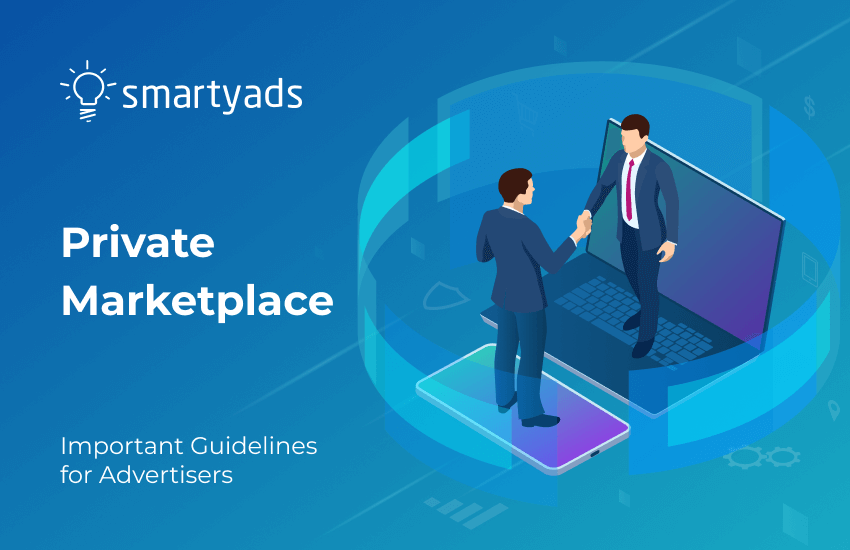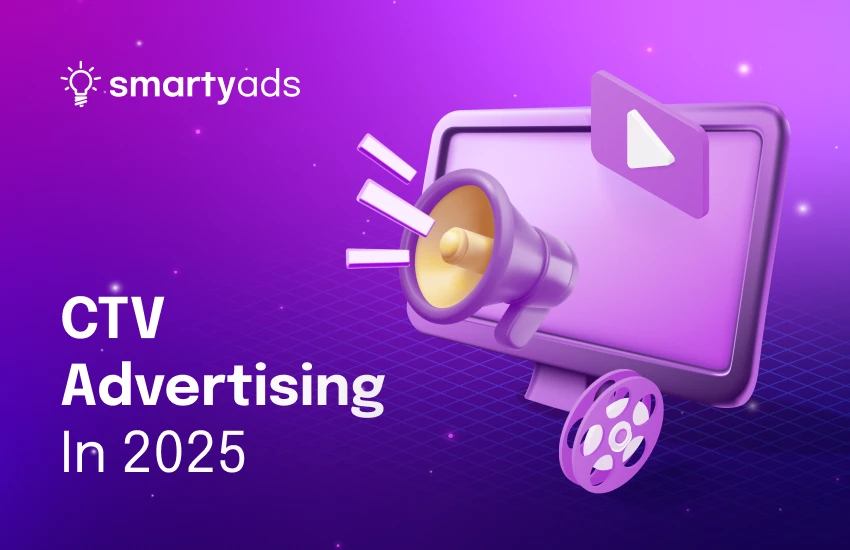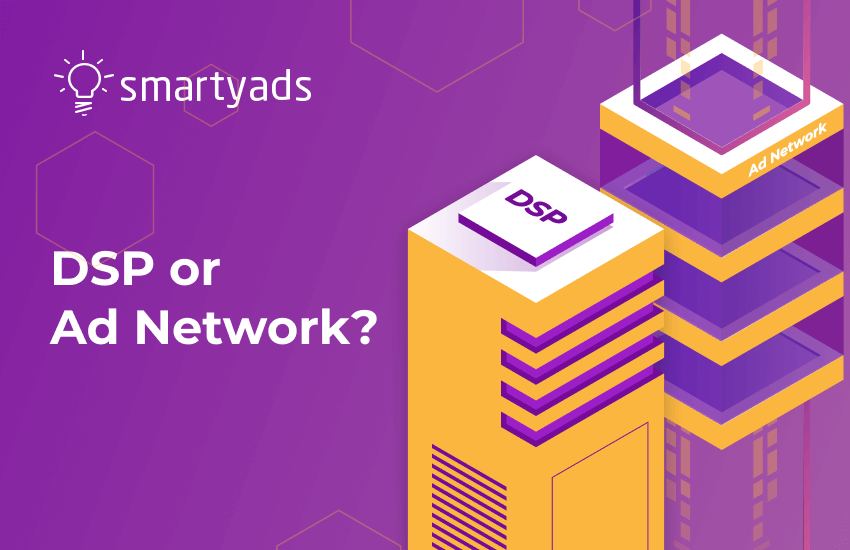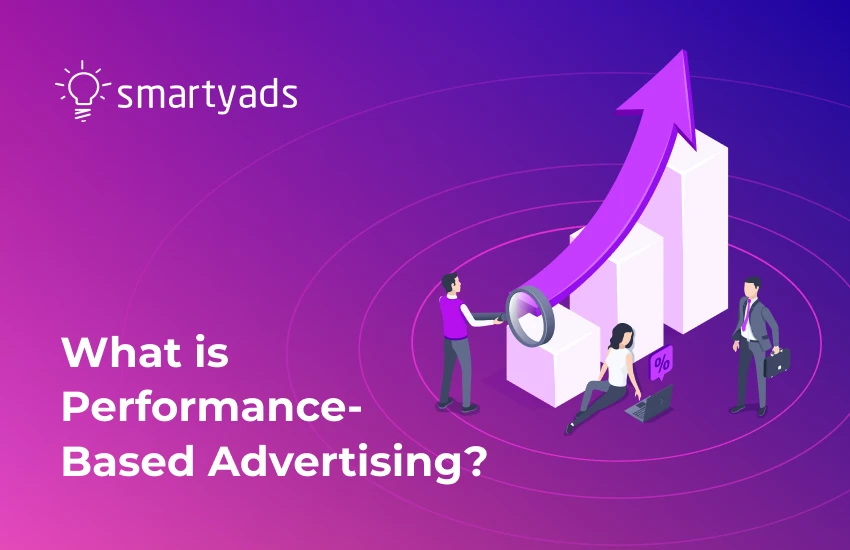The significance of open marketplaces in programmatic advertising cannot be overstated. They offer a diverse and inclusive space for PMP media purchasing that is easily accessible. Alongside open exchanges, real-time bidding auctions also incorporate private marketplaces (PMPs). What does pmp stand for in advertising, and why are advertisers choosing those for media buying? Let us delve into this subject in greater detail and explore the rationale behind their widespread adoption. It is my pleasure to invite you to join me on this informative and optimistic journey with sincerity and enthusiasm.

What is a private marketplace (PMP)?
To understand pmp advertising meaning for advertisers, let's first start with definitions:
PMP private marketplace is a customized programmatic private auction based on exclusive invitations for a number of selected demand and supply partners. Premium publishers can choose certain inventory within the private marketplace and offer it to a specific group of buyers. Advertisers, on the other side, get better ad fraud protection and brand safety. We’ll explore their benefits in more detail later on, and now let’s point out a place of the PMP marketplace within the programmatic ecosystem.
As we already know what a private marketplace is, let’s make it clear that a programmatic private marketplace is a variation of real-time bidding auctions.
The buyers join the auction via invitation and then bid on suggested inventory, just like in open RTB. The priority of PMP deals is usually higher than that of an open marketplace, which allows advertisers to get access to premium inventories before they reach an open auction. It is also considered a part of programmatic direct advertising, which includes preferred deals and programmatic guaranteed. However, there is a difference, as other direct deals usually don’t involve an auction and usually imply a fixed price.
PMP marketplace is different from an open marketplace, where every advertiser has access to all the inventory from supply partners without the need for invitations. While supporting the benefits of programmatic advertising, the private marketplace allows advertisers to reserve the inventory before publishers start selling it on the open RTBs.
Private marketplace online advertising unites the benefits of both direct deals and RTB auctions. Direct deals include higher transparency of ad placement and pricing and high-quality inventory. On the other hand, RTB auctions automate trading processes, saving lots of time and effort for both parties.
PMP (private marketplace) deal usually works well for everyone, as publishers get premium rates, and the advertisers get exclusive access to the inventory before it gets to the open exchanges.
What is private marketplace advertising and why is it popular?
Now that we have a pmp definition in advertising, we can easily give an answer to the question, “How does private marketplace work?” So, it is time to investigate what is PMP in advertising and why more and more advertisers are choosing this auction model.
When RTBs and automated auctions started to dominate the digital advertising industry, some of the cons of open exchanges became apparent. Worries about ad fraud and transparency pushed marketers towards PMP media trading with premium inventory and high-quality advertising campaigns powered by first-party data.
Although open RTBs have long been considered the most widespread type of programmatic, PMPs are getting more and more popular each year. According to Emarketer, 14% of advertisers and 33% of publishers claim that PMP advertising is the trend, defining advertisers’ programmatic strategies for Q3 2023. This trend is observed not only for display advertising but also for other formats — mobile, video, radio, and TV. The main point is that PMPs help to overcome numerous challenges associated with reach limitations.
Oleg Sokolan, Director of Demand at Admixer explains the idea and provides an example:
.jpg) "Nowadays, machine learning (ML) is not something unique or extremely expensive. Most of the Tier-1 ad exchanges use it to decrease infrastructure costs by throttling traffic. Simply put, if you target Madrid, Spain, expecting to reach all the citizens, throttler won’t let you do this at once. You will get just a small batch of the available Madrid traffic for the first 4 hours. Then, ML will analyze ad campaign behavior and add more traffic gradually. I’m not sure if you ever get all the traffic you want. Even if you do, it’s going to take at least a week. But what if you need to reach as many unique Madrid citizens as possible today? Set a PMP! It ignores the limitations, helping you to reach the goal."
"Nowadays, machine learning (ML) is not something unique or extremely expensive. Most of the Tier-1 ad exchanges use it to decrease infrastructure costs by throttling traffic. Simply put, if you target Madrid, Spain, expecting to reach all the citizens, throttler won’t let you do this at once. You will get just a small batch of the available Madrid traffic for the first 4 hours. Then, ML will analyze ad campaign behavior and add more traffic gradually. I’m not sure if you ever get all the traffic you want. Even if you do, it’s going to take at least a week. But what if you need to reach as many unique Madrid citizens as possible today? Set a PMP! It ignores the limitations, helping you to reach the goal."
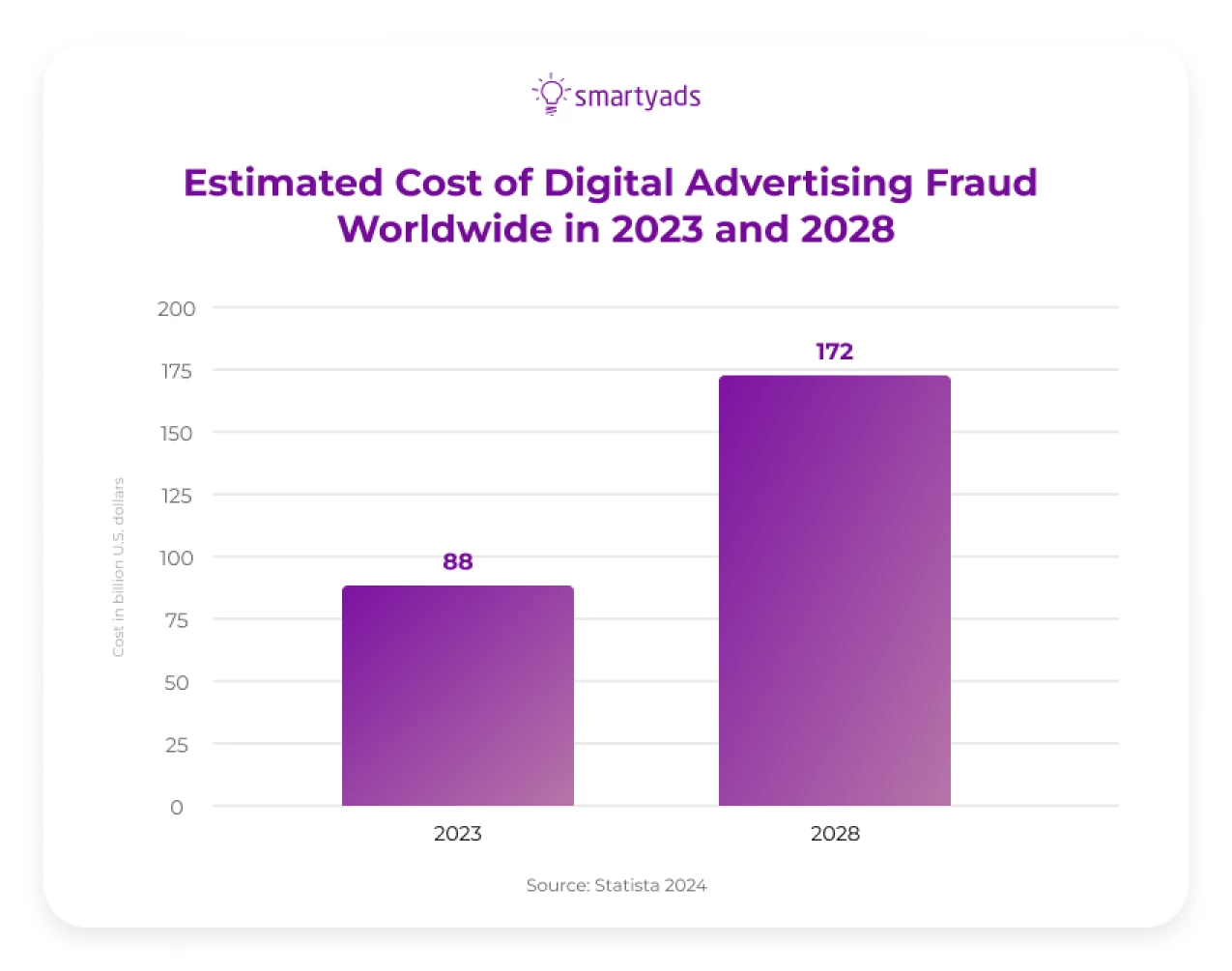
One of the reasons for its rising popularity is ad fraud detection, which is much easier to perform within open exchanges than in a private marketplace. One of the estimates from Emarketer predicts colossal losses to ad fraud, reaching $88 billion in 2023. This is a very important factor for premium publishers and advertisers who are specifically concerned with their brand safety.
An inappropriate ad or placement could do serious damage even to an established brand, so many well-known media owners have started to rely more on PMPs. For instance, Digiday reports that 95% of programmatic buys made by ESPN are performed through PMP in ad tech solutions.
PMPs also ensure stronger partnerships between supply and demand as both sides of the auction are known. Because of this, partners can build trust and establish a continuous relationship once their initial trading shows successful results.
Finally, PMPs provide publishers with an opportunity to set a fixed floor price, which ensures them a reasonable revenue defined by the quality of the inventory. Similarly to header bidding trading, this gives publishers more power over their inventory.

What does private marketplace mean for advertisers
Although open marketplaces are often the main source of inventory for advertisers, there are some significant benefits of PMP in programmatic media trading that make this model especially attractive. Since we have already covered the private marketplace (PMP) definition and why it is getting so popular, we can finally have a look at some of these benefits in more detail:
Efficiency — Combined with benefits from direct sales, private marketplaces still offer a huge level of automation that saves advertisers lots of time, just like open RTBs. Purchasing inventory via the PMP demand-side platform enables them to make fast and beneficial deals with publishers without relying on human teams and spending hours negotiating. Sometimes, there is even an opportunity to buy packages of inventory grouped by specific business verticals, which saves even more effort.
Brand safety — While buying inventory via an open marketplace, advertisers cannot be sure who they are buying ad spaces from and how it could affect their reputation. This can lead to serious losses, especially if an ad appears within violent, extremist, or simply inappropriate content. Such a situation is not rare, so many brands turn to PMPs in search of reputation protection.
First-party data — Private marketplace data lets advertisers directly get accurate information from the publishers regarding their audience, traffic volumes, and engagement rates if there is an agreement and leverage for this option. Consequently, they can adjust their messages and formatting much more precisely, and the performance of their ads can get much higher compared to an open marketplace where these factors are getting random at times. Such usage of audience data is also beneficial for users, as they are more likely to receive relevant messages instead of random and sometimes even annoying ads.
Transparency — A clear understanding of all the details is probably one of the best things about private marketplaces. Apart from brand safety and stronger partnerships, PMPs ensure that each participant of the auction knows exactly who they are trading with, what the clear value of the inventory is, and what exactly they are getting for their money. Once the deal is struck, there can’t be any surprises, as everyone already knows exactly what the terms are. Such an approach can relieve many buyers' pains and give them better clarity for making important strategic decisions regarding their ad campaigns.
Higher ROI — Using a private marketplace is also a good way to increase your return on investment. Using cutting-edge programmatic technologies, PMPs can significantly reduce your spending on media trading since it replaces lots of manual work in managing campaigns and negotiating with publishers. Moreover, private marketplaces are well-known for doing a great job of preventing inventory fraud and providing transparency. Therefore, the potential losses to ad fraud are minimized, and consequently, your ROI gets higher than that from an open marketplace.
Becoming standard — As we have already discussed, PMPs are getting more popular each year and can become an industry-standard quite soon. It is already available on a wide range of programmatic exchange platforms and can be used for any kind of inventory, from premium to remnant PMP ads.
Common Challenges in PMP Advertising
While private marketplaces (PMPs) offer a range of benefits for private advertisers, there are still some challenges associated with their use.
Higher Costs
One of the primary challenges in PMP (Private Marketplace) advertising is the potential for higher costs compared to open auctions. Advertisers often face increased competition for premium inventory within private marketplaces, leading to higher bid prices. To mitigate this challenge, advertisers should carefully assess the value of the inventory and ensure that the targeting parameters align with their campaign objectives. Additionally, negotiating favorable deals with publishers and setting realistic budgets can help control costs and improve the overall efficiency of PMP advertising campaigns.
Limited Inventory
Limited inventory availability is another common challenge in PMP advertising. Private marketplaces offer exclusive access to premium ad placements, but this exclusivity can also result in limited inventory, especially for niche audiences. Advertisers can address this issue by diversifying their PMP partnerships and collaborating with multiple publishers. This strategy broadens the available inventory pool, increasing the chances of finding suitable placements. Advertisers should also actively communicate their campaign requirements with publishers to secure priority access to relevant inventory.
Potential Complexity
The potential complexity of PMP advertising can pose a challenge for private advertisers, particularly those new to the private marketplace model. Setting up and managing private deals, negotiating terms, and navigating various platforms can be daunting. Advertisers can overcome this challenge by investing time in understanding the PMP ecosystem, leveraging user-friendly platforms, and seeking guidance from industry experts. Automation tools and streamlined communication channels with publishers can simplify the management process. Additionally, ongoing monitoring and optimization efforts will contribute to maximizing the effectiveness of PMP campaigns and minimizing operational complexities.
How to use private marketplace
There are many reasons to start using private marketplaces, especially for ad formats that are not available on the open marketplace or to get access to specific inventory packages. In any case, getting started shouldn’t be a big deal, even for a beginner.
Getting started with private marketplace auctions might seem daunting. However, it is a simple process that can be easily managed by following a few steps. These are the steps to participate in private marketplace auctions:
1. Sign up
Sign up for a demand-side platform (DSP) like SmartyAds DSP.
2. Fill in
Fill in your campaign details, such as budget, targeting options, and ad creatives.
3. Select
Select the option to participate in private marketplace auctions and enter your deal ID.
4. Filter
Filter the specific inventories you need by formats, industries, geos, and other relevant parameters.
5. Manage
Manage and adjust your campaign as needed.
You can experiment with different types of deals or stick to the private ones — they are all easily manageable and adjustable.
By following these steps, you can easily participate in private marketplace auctions and access the inventory you need for your campaigns. The process is fast and enjoyable, thanks to the advancements in programmatic technology.
Bottom line
Let's wrap up by exploring the exciting world of Private Marketplace (PMP) advertising — a dynamic environment that offers exclusive inventory, transparency, and pinpoint targeting.
Although there may be some hurdles to overcome, like higher costs and complexity, with strategic planning and a good grasp of auction dynamics, these challenges can be turned into opportunities. By thoughtfully choosing a PMP strategy that aligns with your campaign goals, advertisers can unlock the full potential of this unique advertising landscape. Get ready to unleash your creativity and see your brand soar to new heights!
Welcome to the private marketplace at SmartyAds DSP!
FAQ
In digital advertising, PMP stands for Private Marketplace. PMP is an invitation-only auction where publishers offer premium ad inventory to a select group of advertisers. It provides an exclusive and controlled environment, allowing private advertisers to negotiate pricing, access premium placements, and ensure brand safety. PMPs offer greater transparency and targeting precision compared to open auctions.
PMP meaning in advertising is huge. It is here to offer exclusive access to premium inventory, ensuring brand safety and targeting precision. Private advertisers benefit from enhanced transparency, direct relationships with publishers, and reduced ad fraud. With granular control over placements and audience targeting, PMPs provide a more controlled advertising environment, resulting in improved campaign performance and higher-quality impressions.
In a Private Marketplace (PMP), the auction process involves a select group of advertisers bidding for premium inventory. Publishers invite specific advertisers to participate in a closed auction, where bids are submitted privately. The highest bidder secures the ad placement. This exclusive and controlled environment allows for better pricing negotiation, increased transparency, and targeted placements.

